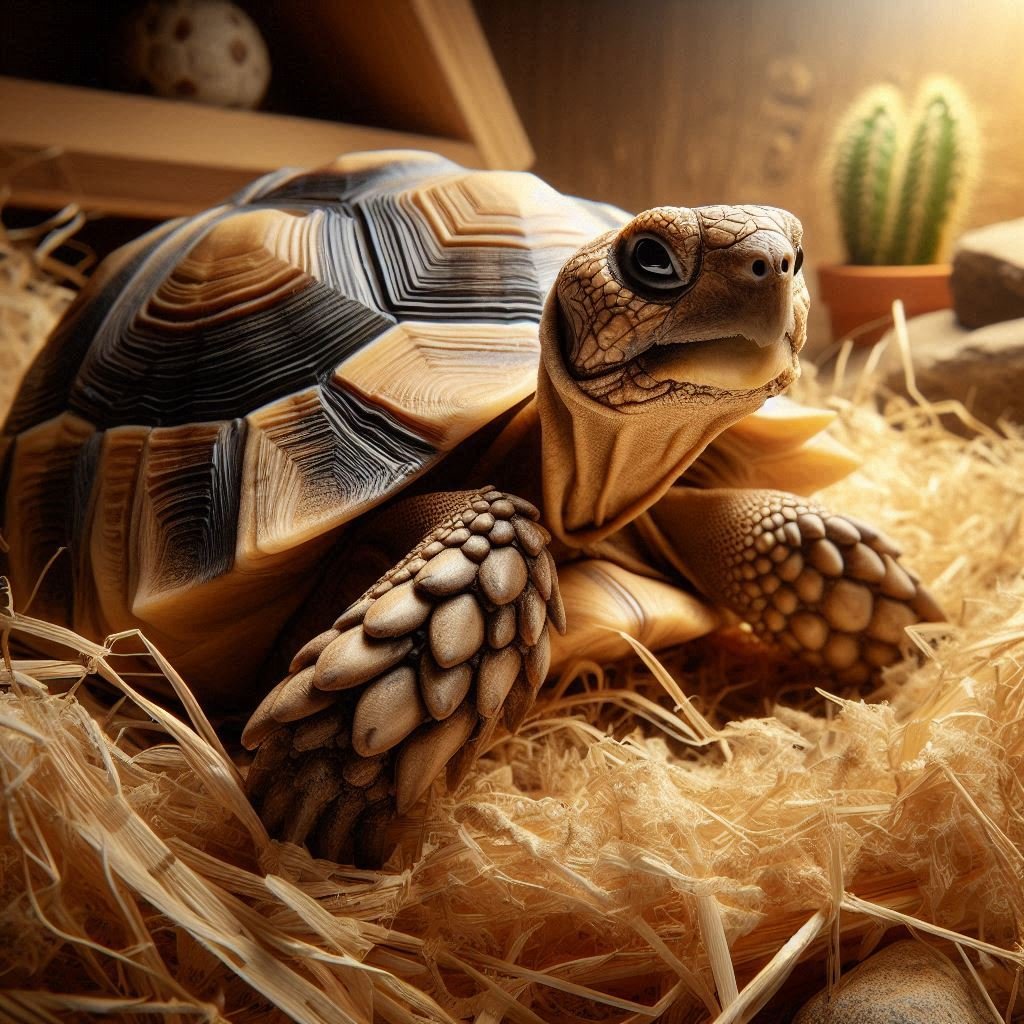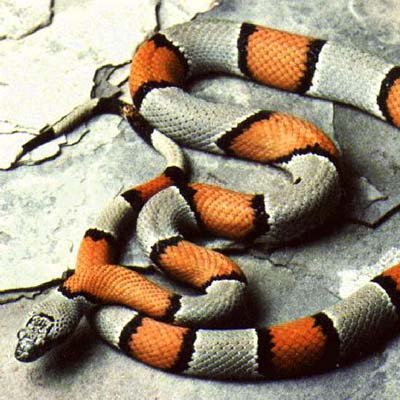
Image from: https://malibucreekstatepark.org/
California Mountain Kingsnake
Scientific name
Lampropeltis zonata
Lifespan
15 to 20 years
Size
3 to 4 feet
Diet
Rodents, small birds, lizards
Annual Cost
$100–$400
Estimated Price
$100–$300
California Mountain Kingsnakes: Appearance and Origin
The California Mountain Kingsnake (Lampropeltis zonata) is a non-venomous, strikingly beautiful snake species belonging to the colubrid family. These snakes are often called by other names such as "Mountain Kings" or simply "Kingsnakes." Known for their bold red, black, and white banding, they mimic the appearance of the venomous coral snake as a defense mechanism, although they are harmless to humans.
Adult California Mountain Kingsnakes typically reach a length of 3 to 4 feet, with females slightly larger than males. Rarely, they can grow up to 5 feet under optimal conditions. Their banding patterns vary slightly by subspecies, and selective breeding in captivity has produced unique morphs, such as albino or anerythristic variations, though these are rare and highly sought after.
These snakes have a lifespan of 15 to 20 years in captivity, provided they receive proper care, while wild specimens may live slightly shorter lives due to predation and environmental factors. Physically, they are slender with smooth scales and a distinct head slightly wider than their neck.
Native to the western United States, they inhabit regions from southern Oregon to northern Baja California, Mexico. They prefer forests, woodlands, and rocky outcroppings, thriving in cool, damp environments with ample hiding spots. Shedding occurs every 4–6 weeks, and healthy snakes shed their skin in a single piece. Breeding them in captivity is moderately challenging but rewarding, requiring precise environmental conditions.
Advertisement
California Mountain Kingsnake Care Tips and Common Health Problems
California Mountain Kingsnakes are generally hardy, but they are susceptible to common health problems such as respiratory infections, mites, and gastrointestinal issues caused by poor husbandry. Symptoms like wheezing, mucus around the mouth or nose, lethargy, or lack of appetite should prompt a visit to an experienced reptile veterinarian.
Quarantine is essential when introducing a new snake to your collection to prevent the spread of disease. A 30-day quarantine period in a separate enclosure is recommended, during which you should monitor for signs of illness. Regular cleaning, appropriate humidity, and correct temperatures help prevent health issues. Annual veterinary checkups are crucial and may cost $50–$100 depending on location.
Initial costs for setting up a proper enclosure range from $200 to $500, including the tank, heating equipment, and substrate. Ongoing expenses like food, cleaning supplies, and utilities amount to $200–$300 per year. Reliable grooming products, such as disinfectants from brands like Zoo Med or Exo Terra, can be purchased online through retailers like Amazon or Chewy.

Image from: https://reptilesupershow.com/
California Mountain Kingsnake Food and Diet?
California Mountain Kingsnakes are carnivorous and primarily feed on rodents, small birds, lizards, and eggs in the wild. In captivity, a diet of appropriately sized frozen-thawed mice is ideal. Juveniles typically eat once a week, while adults can be fed every 10–14 days.
Always ensure food quality by sourcing from reputable suppliers. Thaw frozen prey completely before offering it to the snake using warm water. Feeding inside their enclosure is common, but using a separate feeding container can prevent substrate ingestion. If the snake refuses food, reducing handling or trying a different prey size may help. Fresh water in a shallow dish should always be available, changed every 2–3 days. Calcium and multivitamin supplements are rarely necessary but can be used under a veterinarian's guidance.
Advertisement
How to Setup California Mountain Kingsnake Habitat?
For a juvenile California Mountain Kingsnake, a 10-gallon tank is sufficient. Adults require at least a 20-gallon long tank, with larger enclosures recommended for more active individuals. A secure lid is essential, as these snakes are skilled escape artists.
Use aspen bedding or cypress mulch as substrate, as they retain moisture well without causing impaction. Include at least two hiding spots—one on the warm side and one on the cool side of the enclosure. Adding branches or artificial plants encourages climbing and mimics their natural environment.
Maintain a temperature gradient with a warm side of 85–90°F and a cool side of 75–80°F. A heat lamp or under-tank heater regulated by a thermostat works well. Nighttime temperatures can drop to 65–70°F. Humidity levels should be around 40–60%, achievable with regular misting and a shallow water dish. Brands like Zoo Med and Exo Terra offer reliable heating and humidity control products.
Clean the enclosure weekly, removing waste and soiled substrate. A basking area, soaking dish, and enrichment items like tunnels or cork bark add variety to their habitat. Avoid sharp objects or overcrowding that could harm your snake. Simulating their natural habitat with rocks and foliage enhances their well-being.

Image from: https://www.tehachapinews.com/
California Mountain Kingsnake Behavior: Are They Good as Pets?
California Mountain Kingsnakes are known for their calm temperament, making them suitable for both beginner and experienced snake keepers. They rarely bite, but when they do, it’s usually a defensive response. They are non-venomous and rely on constriction to subdue prey in the wild.
These snakes are solitary and should not be housed with other species. Even cohabitating with another Kingsnake is risky unless they are a breeding pair in a controlled setup. They enjoy exploring, so supervised handling can be enjoyable for both the snake and the owner. However, free-roaming in the house is not recommended due to safety concerns.
While they adapt well to human interaction, care must be taken with children. Their gentle nature doesn’t guarantee they won’t stress or strike if mishandled. Captive-bred snakes are more docile and predictable than wild-caught ones. For portability, use a secure travel container to ensure their safety.
Advertisement
How To Choose A California Mountain Kingsnake for Home?
When adopting a California Mountain Kingsnake, choose a healthy individual with clear eyes, smooth scales, and a firm body. Avoid snakes with stuck sheds, mites, or signs of respiratory distress. Captive-bred snakes are preferable as they adapt better to handling and have fewer health issues.
Expect to pay $100–$300 for a California Mountain Kingsnake, depending on its morph and lineage. Exotic morphs may cost significantly more. In the USA, they are readily available through breeders and specialized pet stores, but check state regulations, as some areas may restrict ownership.
Internationally, availability varies. They can be found in Canada, Japan, and parts of Europe, typically priced similarly to their cost in the USA. Documentation proving captive breeding is essential, especially for rare morphs. Adopting a juvenile snake ensures easier handling and bonding as it matures.












No comments posted yet !